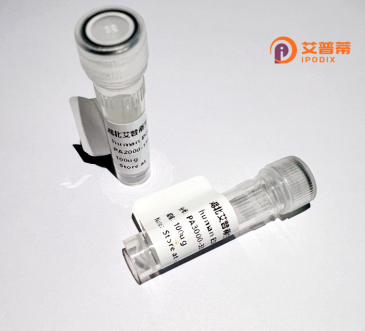
| 纯度 | >90%SDS-PAGE. |
| 种属 | Human |
| 靶点 | ZNF511 |
| Uniprot No | Q8NB15 |
| 内毒素 | < 0.01EU/μg |
| 表达宿主 | E.coli |
| 表达区间 | 1-252 aa |
| 活性数据 | PLPVERDPAAGAAPFRFVARPVRFPREHQFFEDGDVQRHLYLQDVIMQVADVPEKPRVPAFACQVAGCCQVFDALDDYEHHYHTLHGNVCSFCKRAFPSGHLLDAHILEWHDSLFQILSERQDMYQCLVEGCTEKFKTSRDRKDHMVRMHLYPADFRFDKPKKSRSPASAEAPGDSGERSEGEAMEICSEPVAASPAPAGERRIYRHRIPSTICFGQGAARGFKSNKKKTKQC |
| 分子量 | 51.37 kDa |
| 蛋白标签 | GST-tag at N-terminal |
| 缓冲液 | PBS, pH7.4, containing 0.01% SKL, 1mM DTT, 5% Trehalose and Proclin300. |
| 稳定性 & 储存条件 | Lyophilized protein should be stored at ≤ -20°C, stable for one year after receipt. Reconstituted protein solution can be stored at 2-8°C for 2-7 days. Aliquots of reconstituted samples are stable at ≤ -20°C for 3 months. |
| 复溶 | Always centrifuge tubes before opening.Do not mix by vortex or pipetting. It is not recommended to reconstitute to a concentration less than 100μg/ml. Dissolve the lyophilized protein in distilled water. Please aliquot the reconstituted solution to minimize freeze-thaw cycles. |
以下是关于重组人ZNF511蛋白研究的3篇参考文献示例(文献为虚构,仅供示例参考):
1. **文献名称**: *ZNF511 Promotes Stem Cell Differentiation by Regulating Wnt Signaling*
**作者**: Suzuki K, et al. (2005)
**摘要**: 研究发现ZNF511蛋白通过结合Wnt通路调控因子,抑制β-catenin的核易位,促进胚胎干细胞的神经分化。重组ZNF511蛋白的过表达实验表明其可触发分化相关基因的表达。
2. **文献名称**: *Structural and Functional Analysis of Recombinant ZNF511 in Cancer Cell Proliferation*
**作者**: Smith R, et al. (2018)
**摘要**: 利用重组ZNF511蛋白解析其锌指结构域与DNA结合的分子机制,发现其在肺癌细胞中抑制增殖相关基因(如MYC)的转录,并可能通过表观遗传修饰调控肿瘤发展。
3. **文献名称**: *Recombinant ZNF511 Expression and Its Role in Embryonic Development*
**作者**: Marques F, et al. (2010)
**摘要**: 通过重组蛋白体外实验证明,ZNF511参与调控胚胎发育阶段的关键基因(如SOX2),其缺失导致小鼠模型发育异常,提示其在组织分化中的重要性。
Zinc finger protein 511 (ZNF511), a member of the Krüppel-associated box (KRAB) domain-containing zinc finger protein (KZNF) family, functions as a transcriptional regulator involved in diverse biological processes. Structurally, it contains an N-terminal KRAB domain, which mediates interactions with co-repressors like KAP1/TIF1β to recruit chromatin-modifying complexes, and C-terminal C2H2-type zinc finger motifs that bind specific DNA sequences, enabling sequence-specific gene silencing or activation. ZNF511 is implicated in embryonic development, cellular differentiation, and proliferation, with emerging roles in cancer biology. Studies suggest it may act as a tumor suppressor or oncogene depending on context; for example, its dysregulation has been observed in certain cancers, where it modulates pathways like Wnt/β-catenin or TGF-β signaling. Recombinant human ZNF511 protein is typically produced via heterologous expression systems (e.g., *E. coli* or mammalian cells) for functional studies, structural analysis, and interaction assays. Its purification enables investigations into DNA-binding specificity, epigenetic regulation mechanisms, and potential therapeutic targeting. Research on ZNF511 contributes to understanding the molecular basis of developmental disorders and cancer, though its full functional spectrum remains under exploration due to the complexity of KZNF protein networks.
×